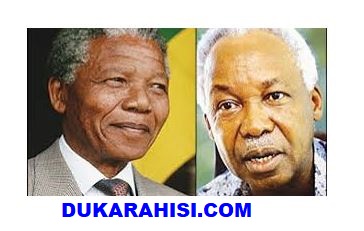INDEPENDENCE STRUGGLES IN TANGANYIKA (TANZANIA)
Independence is the state of a society to be free and be able to make its own decisions in its affairs without being interfered by any external pressure. An independent nation is also said to be a sovereign state.
Tanganyika attained her full political independence in 1961 December 9th with the last British governor sir Richard Tumbull and the late Mwl. Julius Nyerere who was the prime minister and became the first president of Tanganyika.
A more systematic political movement started with Tanganyika African Association (TAA).
On 7th July 1954, seventeen leading TAA members assembled for a conference in Dar-es-Salaam. Their purpose was to change the aims and objectives of TAA which had been semi-political.
TAA was transformed to a full-fledged political party called Tanganyika African National Union (TANU). The new party adopted one major aim: the attainment of national independence. Julius Kambarage Nyerere was elected its first president.
After its formation, TANU started embarking on a number of organizational tasks:
1. To mobilize the people to fight for national independence.
2. To educate the people on unity and against divisive obstacles such as tribalism, racism and religious differences.
3. To consolidate and provide political direction to the trade unions.
TANU had its Youth League, which became very useful in organizing meetings and propagating the message of Uhuru in both urban and rural areas.
At the international level, TANU capitalized on Tanganyika trusteeship. It appealed to UNO for sympathy and support.
The colonial administration tried to frustrate the moves of TANU. TANU was called a riotous movement. The colonial government prevented civil servants from joining it. Then the colonialists sponsored the formation of reactionary organizations, e.g., the formation of United Tanganyika Party (UTP), formed by chiefs in 1956.
TANU faced all the challenges boldly. It called for a democratically elected legislative council (LEGCO). Finally, the colonial government agreed to have elections of members to LEGCO which would be based on racial parity. In its conference at Tabora in 1958, TANU agreed to take part in the elections.
In the 1958 general election, TANU won massively. All the TANU-sponsored candidates won election irrespective of their racial origins. All the UTP candidates were defeated, and the party died altogether.
The strength of TANU made the colonialists deal with it more liberally. Some members, however, accused the party of moderate policies. They wanted a more militant African stand. The group with this view broke away from TANU and formed the African National Congress (ANC) in 1958.
Even after the split, TANU remained strong. Meanwhile, Britain went ahead laying the ground for extended relations with post-independence Tanganyika.
In the polls of August 1960, TANU won massively again. It formed a government that worked together with the colonial government for a smooth transfer of power.
On 9th December 1961, ANC ceased to exist following its total defeat in the presidential elections. Julius Kambarage Nyerere, the president of TANU, became the first Prime Minister of Tanganyika.
Tanganyika was once a German colony and a British colony at different times. It regained its independence on Sunday at 12:00 am on 9th December in 1961 under the abled leadership of its first Prime Minister the late Mwl. Julius Kambarage Nyerere with his party (TANU – Tanganyika African National Union)
He supported socialist policies to address the country’s economic problems. Believing in the importance of preserving native African culture, he encouraged the use of the Kiswahili language and emphasized Ujamaa (“family hood”), a unique form of rural socialism. Nyerere retired as president in 1985
However, in 1964 it united with Zanzibar to form Tanzania. Independence in Tanganyika was successful achieved under TANU (Tanganyika National Unity) was a political party under Mwl. Nyerere.
THE MAIN OBJECTIVES OF THE TANU

It was founded on seventh of July in 1954 replacing the T.A.A (Tanganyika African Association).
It had the following objectives:
1. To prepare the people of Tanganyika for self-governance and independence.
2. To dismantle tribalism and ethnicity which were great enemies to unity and the struggle for freedom as a nation.
3. To struggle for a democratic government and to have representatives in local district and the central government.
4. To encourage and sensitize workers to join trade and cooperative unions which could be the right forum for them to air out their grievances such as land alienation, taxation, poor working conditions together with low wages against colonialism.
5. To cooperate with other nationalistic political parties in other African countries towards the struggle for independence. For example, The T.A.N.U under the leadership of the late Mwalimu Julius Kambarage. Nyerere cooperated fully with the A.N.C (the African National congress) in South Africa to end apartheid policy in 1994.
REASONS WHICH MADE TANGANYIKA TO ATTAIN HER INDEPENDENCE EARLIER THAN OTHER EAST AFRICAN COUNTRIES (KENYA AND UGANDA)
Qn: Explain why did Tanganyika regain her independence earlier than Uganda and Kenya?
Qn: Assess the social, economic and political developments in Tanganyika which made it the first East African colony to regain independence
1. Good and charismatic leadership of the Late Mwl. Julius Kambarage Nyerere. He was able to organize and structure the T.A.N.U from a mere welfare oriented to as a strong nationalistic party which led Tanganyika to independence, he used to travel almost annually to the UNO trusteeship council to plead for the independence of Tanganyika.
2. Good and clear policies of the T.A.N.U, which were easily understood by both literate and illiterate Tanganyikans both in rural and urban areas. Examples of the T.A.N.U slogans and policies are/were: UHURU NA KAZI, TANU YAJENGA NCHI and UHURU NA UMOJA.
3. The role played by Kiswahili language. Kiswahili was used as as a lingua franca, it acted as a unifying factor; it was spoken throughout the country. It became the corner stone which spread the T.A.N. U’s policies and slogans.
5. The absence of strong tribalism and ethnicity. Unlike other countries such as Uganda and Kenya where ethnicity acted as a great barrier towards the struggle for independence, in Tanganyika people from different tribes were united together to struggle for independence.
6. Absence of many settlers. Tanganyika had no many settlers as opposed to Kenya which was dominated by many settlers, thus in Tanganyika, there were like European antagonism against Africans.
7. Tanganyika was a mandate territory. Tanganyika was a mandate territory which was administered by the British as a trusteeship on behalf of the League of Nations, and later the U.N.O. Thus, Tanganyika was the trusteeship territory being prepared ready for independence. Such status hurried the nationalists’ campaigns for the independence of Tanganyika through the U.N.O forum; as a result, the British did not intensify their control because it was under protectorate.
For example, Nyerere stated in his independence address to the United Nations General Assembly on 14th December in 1961, that “Because Tanganyika was a Trust Territory under British administration, this was a great help in my work to achieve independence for the country, namely peacefully and through nonviolent methods”.
8. The role played by Mass media. Mass media like newspapers such as SAUTI YA TANU. The educated people spread the TANU’s policies and slogans through these newspapers, they wrote several articles on the newspapers emphasizing the need for the Tanganyika to govern them; such messages awakened Tanganyika’s towards the struggle for the freedom.
9. Support from the last British Governor to Tanganyika. Sir Richard Turnbull became the best friend to Mwalimu Nyerere; he from time-to-time supported Mwalimu in his struggle for freedom that is why historians argue that the appointment of Sir Richard Turnbull in 1958 to be the Governor in Tanganyika facilitated the movement towards the struggle for independence.
10. The role played by the T.A.N.U youth league which was composed of young energetic people who spread the TANU’s policies and slogans to its supporters throughout the country. E.g., Christopher Mtikila and Willibrod Slaa.
11. The role played by women in the T.A.N.U’s politics. Women in TANU made it popular thus gained much support from the public. They played an important role in mobilizing the masses to support the TANU. They gave vigor and color to the TANU’s public rallies and demonstrations. A notable example of these women was Bibi Titi Mohamed, Vicky Nsilo Swai and Lucy Lameck.
PROBLEMS FACED TANGANYIKA DURING THE STRUGGLE FOR INDEPENDENCE
Qn: Explain six problems faced nationalistic struggle in Tanzania
There is no easy walk to freedom; Tanganyika faced various challenges such as discussed below.
1. Lack of adequate funds to organize and run the activities. During the 1960s still many people under the colonial rule was extremely poor and depended on wages from colonial economy, so was the party even its leader Nyerere was a mere teacher
Thus the lack of funds made them to lack their accessibility to run the party activities and visit many places and hence slaved the walk to freedom. They also lacked transport fees and wages to activists.
2. Strong opposition from colonial government. Independence activist were not allowed to speak in clouds or meet to discuss issues concerning with independence.
Some of the independence activists were assassinated, jailed while some were exiled. This was purposely to safeguard the colonial interest particularly trade.
3. Lack of unity among the people. Some people saw the freedom fighters as troublemakers thus; they discouraged and weakened the freedom fighters by high criticism.
Most of these people were those who enjoyed the fruits of colonial era particularly Arab Swahilis also some people joined other parties and thus many political parties divided many people to different ideologies.
4. Vastness of the country. This was one of challenges that hindered early achieving the independence of Tanganyika. It has about hundreds of kilometer squares of land.
Travelling to all places to meet the people and organize them to struggle for independence was a very tough challenge. Some places were very remote and others surrounded by physical barriers such as lakes and mountains.
5. Poor transport facilities. This was primarily caused by poor advancement of technology in the sectors of infrastructure. There were impossible roads, seasonal roads and defective trains as major means for transport.
In some areas, there were very dense wild animals, forest and high dangerous mounts that passed as a barrier to transport vehicle like cars. This in turn slaved (limited) down the nationalists’ activists to excel well.
6. Strong opposition from other opposition political parties. Other opposition political parties such as AMNUT (All Muslim National Union of Tanganyika) and ANC (African National Congress) posed a very strong opposition to freedom fighters during their struggle to attain independence thus, they supported the colonial government.
Good example is cited in 1958 where Zuberi Mtemvu formed ANC (African Nationalist Congress) which went against TANU’s policies. In this scenario, the move to attain independence was indeed minimized.
Generally, it may be concluded that despite tireless attempts posed by the people in Tanganyika, in the course of time they achieved for their independence in 1961, Mwalimu Julius Kambarage Nyerere spearheading the nation and immediately after the attainment of their political independence it united with Zanzibar to form the current Tanzania.



























































